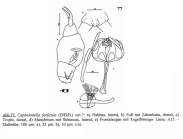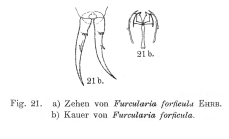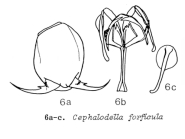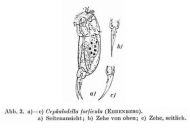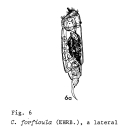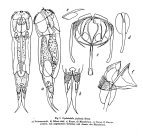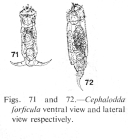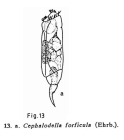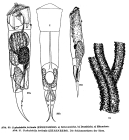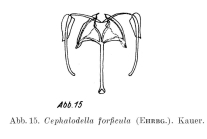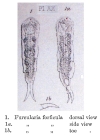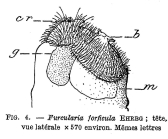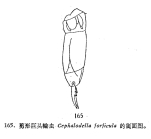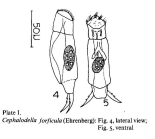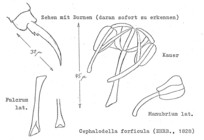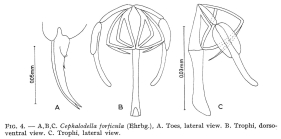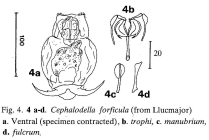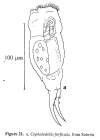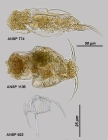WoRMS taxon details
Cephalodella forficula (Ehrenberg, 1838)
1390987 (urn:lsid:marinespecies.org:taxname:1390987)
accepted
Species
Cephalodella tubiformis (King, 1893) · unaccepted > junior subjective synonym
Furcularia forficula Ehrenberg, 1838 · unaccepted > superseded combination
Furcularia trihamata Stenroos, 1898 · unaccepted > junior subjective synonym
Furcularia tubiformis King, 1893 · unaccepted > superseded combination
brackish, fresh
recent only
(of Furcularia forficula Ehrenberg, 1838) Ehrenberg, C. G. (1838). Die Infusionsthierchen als vollkommene Organismen. Ein Blick in das tiefere organische Leben der Natur. Leipzig. Verlag von Leopold Voss, 547, pl.1-64
page(s): p.421, pl.48, fig.5 [details]
page(s): p.421, pl.48, fig.5 [details]
Taxonomy • not Cephalodella forficula (Ehrenberg) after Stenroos (1898) [=C. stenroosi Wulfert], Koste (1976 partim:pl.7, fig.2)...
Taxonomy • not Cephalodella forficula (Ehrenberg) after Stenroos (1898) [=C. stenroosi Wulfert], Koste (1976 partim:pl.7, fig.2) [=Cephalodella tenuiseta (Burn)].
• Koste's (1976) (op. cit.) trophi-figure of C. tenuiseta, sub C. forficula, has apparently been mislabeled.
• The original combination under which this species name was established was hitherto taken to be Distemma forficula Ehrenberg, 1830. As Ehrenberg points out himself in his 'Infusionsthierchen' of 1838, however, Distemma forficula "ist der Furcularia forficula sehr nahe verwandt, hat aber 2 deutliche rothe Augen im Nacken" (p.449, cf. pl.56, fig.2). This clearly contrasts with the bright red frontal eye of Furcularia forficula, as described and figured by Ehrenberg in the same work (p.421, pl.48, fig.5). [details]
• Koste's (1976) (op. cit.) trophi-figure of C. tenuiseta, sub C. forficula, has apparently been mislabeled.
• The original combination under which this species name was established was hitherto taken to be Distemma forficula Ehrenberg, 1830. As Ehrenberg points out himself in his 'Infusionsthierchen' of 1838, however, Distemma forficula "ist der Furcularia forficula sehr nahe verwandt, hat aber 2 deutliche rothe Augen im Nacken" (p.449, cf. pl.56, fig.2). This clearly contrasts with the bright red frontal eye of Furcularia forficula, as described and figured by Ehrenberg in the same work (p.421, pl.48, fig.5). [details]
Jersabek, C. D.; Segers H.; Leitner M. (2026). Rotifer World Catalog (RWC). Cephalodella forficula (Ehrenberg, 1838). Accessed through: World Register of Marine Species at: https://www.marinespecies.org/aphia.php?p=taxdetails&id=1390987 on 2026-01-19
Date
action
by
![]() The webpage text is licensed under a Creative Commons
Attribution 4.0 License
The webpage text is licensed under a Creative Commons
Attribution 4.0 License
Nomenclature
original description
(of Furcularia trihamata Stenroos, 1898) Stenroos, K.E. (1898). Das Thierleben im Nurmijärvi-See. Eine faunistisch-biologische Studie. [Animal life in Lake Nurmijärvi. A faunistic-biological study.]. <em>Acta Societatis pro Fauna et Flora Fennica.</em> 17(1):i-iv, 1-259, pls. 1-3, map 1.
page(s): p.133, pl.2, fig.14 [details]
original description (of Furcularia forficula Ehrenberg, 1838) Ehrenberg, C. G. (1838). Die Infusionsthierchen als vollkommene Organismen. Ein Blick in das tiefere organische Leben der Natur. Leipzig. Verlag von Leopold Voss, 547, pl.1-64
page(s): p.421, pl.48, fig.5 [details]
original description (of Furcularia tubiformis King, 1893) King, H. W. (1893). Observations on the habits of some pond life from the West Indies. Journal of the Quekett Microscopical Club, (ser. 2) 5, 137-145, pl.8-9
page(s): p.139, pl.8, figs.1-5 [details] Available for editors [request]
[request]
page(s): p.133, pl.2, fig.14 [details]
original description (of Furcularia forficula Ehrenberg, 1838) Ehrenberg, C. G. (1838). Die Infusionsthierchen als vollkommene Organismen. Ein Blick in das tiefere organische Leben der Natur. Leipzig. Verlag von Leopold Voss, 547, pl.1-64
page(s): p.421, pl.48, fig.5 [details]
original description (of Furcularia tubiformis King, 1893) King, H. W. (1893). Observations on the habits of some pond life from the West Indies. Journal of the Quekett Microscopical Club, (ser. 2) 5, 137-145, pl.8-9
page(s): p.139, pl.8, figs.1-5 [details] Available for editors
Other
additional source
Nogrady, T.; Pourriot, R. (1995). Family Notommatidae. In: Rotifera. Volume 3: The Notommatidae and the Scaridiidae. In: T. Nogrady. Guides to the identification of the microinvertebrates of the continental waters of the world. Amsterdam. SPB Academic Publishing, 8, 1-229, 239-248 [details] Available for editors  [request]
[request]
additional source Phillips, L.M., R.I. Leihy & S.L. Chown. (2022). Improving species‐based area protection in Antarctica. <em>Conservation Biology.</em> 36(4): e13885.Aug 2022., available online at https://doi.org/10.1111/cobi.13885 [details]
additional source Phillips, L.M., R.I. Leihy & S.L. Chown. (2022). Improving species‐based area protection in Antarctica. <em>Conservation Biology.</em> 36(4): e13885.Aug 2022., available online at https://doi.org/10.1111/cobi.13885 [details]
 Present
Present  Present in aphia/obis/gbif/idigbio
Present in aphia/obis/gbif/idigbio  Inaccurate
Inaccurate  Introduced: alien
Introduced: alien  Containing type locality
Containing type locality
Nontype ANSP 0774, geounit Pennsylvania [details]
Nontype ANSP 0923, geounit Pennsylvania [details]
Nontype ANSP 1136, geounit Pennsylvania [details]
Nontype CDJ UB138, geounit Mongolia [details]
From editor or global species database
Environment saltwater occurrences include inland saline waters. [details]Grammatical gender Gender agreement: no; name type: noun in apposition [details]
Habitat Littoral microhabitats; Macrophytes (Elodea); Macrophytes (Hippuris dominant); Macrophytes (Hippuris, Myriophyllum, Potamogeton, Ranunculus); Macrophytes (Myriophyllum); Macrophytes (Myriophyllum, Utricularia); Moss (submersed); Mud surface; Open water; Open water (tychoplanktonic); Periphyton; Stream bottom; Stream bottom: POM (sand, gravel, mud); Water ferns (Salvinia molesta, Azolla sp.), and water lenses (Lemna spp.), interrhizon [details]
Taxonomy • not Cephalodella forficula (Ehrenberg) after Stenroos (1898) [=C. stenroosi Wulfert], Koste (1976 partim:pl.7, fig.2) [=Cephalodella tenuiseta (Burn)].
• Koste's (1976) (op. cit.) trophi-figure of C. tenuiseta, sub C. forficula, has apparently been mislabeled.
• The original combination under which this species name was established was hitherto taken to be Distemma forficula Ehrenberg, 1830. As Ehrenberg points out himself in his 'Infusionsthierchen' of 1838, however, Distemma forficula "ist der Furcularia forficula sehr nahe verwandt, hat aber 2 deutliche rothe Augen im Nacken" (p.449, cf. pl.56, fig.2). This clearly contrasts with the bright red frontal eye of Furcularia forficula, as described and figured by Ehrenberg in the same work (p.421, pl.48, fig.5). [details]





